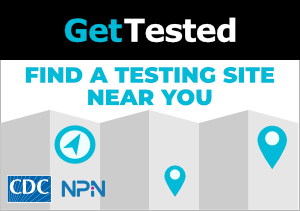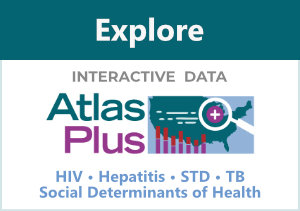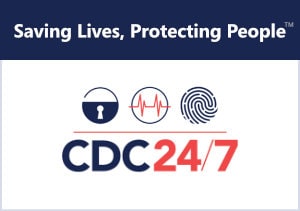Connections (October-November 2023)
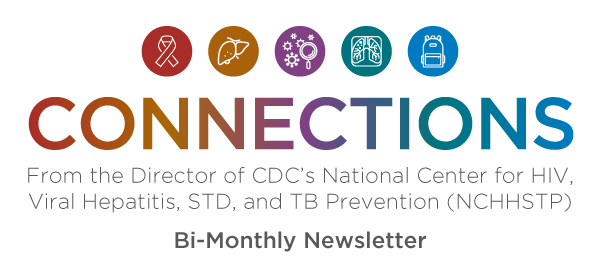
October – November 2023
From the Director – Jonathan Mermin, MD, MPH
CDC is requesting public input by November 16, 2023, for draft guidelines on the use of sexually transmitted infection (STI) post-exposure prophylaxis with doxycycline (Doxy PEP) for preventing bacterial STIs. welcome comments and encourage you to visit the Federal Register :: Guidelines for the Use of Doxycycline Post-Exposure Prophylaxis for Bacterial Sexually Transmitted Infection (STI) Prevention; Request for Comment and Informational Presentation. An informational presentation about the draft guidelines is available online.
STIs are pervasive and increasing rapidly in the U.S. In several studies, doxy PEP has demonstrated substantial benefit in reducing new chlamydia, gonorrhea, and syphilis infections among gay, bisexual, and other men who have sex with men, and transgender women who have had an STI in the prior year.
These new clinical guidelines for healthcare providers describes a new tool to prevent STI infections. However, important questions remain about the effectiveness of this approach for other populations, as well as the potential for development of antimicrobial resistance and unknown effects on the microbiome. CDC will be implementing long-term monitoring and evaluation.
Receiving thoughtful, diverse perspectives will strengthen and improve the quality and use of the first new STI prevention tool in decades.
Thank you for your continued support.
An outbreak of multidrug-resistant (MDR) tuberculosis (TB) involved 13 persons in four households in a low-income, under-resourced urban Kansas community during November 2021–November 2022. Prompt identification, evaluation, and treatment of persons with MDR TB and their contacts is essential to stop the spread of TB, especially MDR TB. Read more in MMWR: Outbreak of Multidrug-Resistant Tuberculosis — Kansas, 2021–2022 | MMWR (cdc.gov)
Summary Sources: Groenweghe E, Swensson L, Winans KD, Griffin P, Haddad MB, Brostrom RJ, Tuckey D, Lam CK, Armitige LY, Seaworth BJ, Corriveau EA. Outbreak of Multidrug-Resistant Tuberculosis — Kansas, 2021–2022. MMWR Morb Mortal Wkly Rep 2023; 72:957-960.
Influenza and Covid-19
Every fall, we are prompted to protect our health from seasonal colds and flu. People with HIV are at higher risk of developing serious flu-related complications, especially those who have a very low CD4 cell count (very suppressed immune system) or who are not taking medicine to treat HIV. People who are immunocompromised are also more at risk of getting COVID-19. CDC offers both influenza and COVID-19 resources for people living with HIV at Flu & People Living with HIV | CDC and COVID-19 and HIV | HIV Basics | HIV/AIDS | CDC.
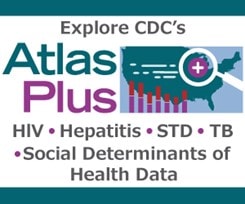
AtlasPlus
What’s New in NCHHSTP’s AtlasPlus: NCHHSTP has added 2021 data including:
- Data on viral hepatitis diagnoses at the national and state levels.
- Estimates from the Medical Monitoring Project (MMP) on two indicators – unstable housing or homelessness and HIV stigma – representative at the national and jurisdiction-levels (for the 16 states and 1 territory that report to MMP).
New Free CE opportunity available!
Driving Hepatitis B Management: Universal Screening and Vaccination in Primary Care (medscape.org) is a free, video-based activity designed to help clinicians integrate updated CDC guidelines for hepatitis B virus screening, testing, and vaccination into daily practice. The activity is valid for credit through June 12, 2024. Listen to experts discuss the updated CDC recommendations and how to address common barriers to integrating CDC recommendations in primary care settings.
CDC recommends single-visit testing for hepatitis C virus to reduce incomplete diagnoses and increase awareness of infection.
Diagnosing hepatitis C virus (HCV) infections requires a two-step testing sequence, which can result in “incomplete” testing if performed over multiple visits. Because many people do not complete the two-part testing sequence, CDC recommends HCV testing be accomplished in a single visit. By reducing the patient burden to complete HCV testing, more people will be diagnosed and cured of this infection. Laboratory, health care, and public health professionals should review CDC’s new operational guidance for complete HCV testing, which provides ways to collect all samples needed to diagnose HCV infection in a single visit.
2021 Viral Hepatitis Surveillance Report and 2023 Viral Hepatitis National Progress Report
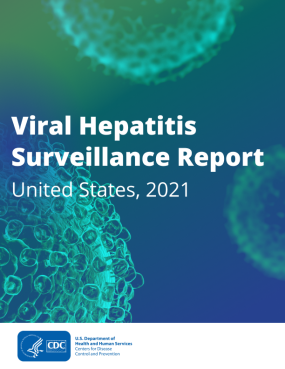
The Viral Hepatitis Surveillance Report— United States, 2021 and the 2023 Viral Hepatitis National Progress Report contain hepatitis A, hepatitis B, and hepatitis C surveillance and mortality data that inform the Nation’s viral hepatitis response and progress towards achieving national viral hepatitis elimination goals.
During 2021 the incidence rate of hepatitis A decreased, marking the resolution of the widespread hepatitis A outbreaks associated with person-to-person transmission in 37 states. Achieving high vaccination coverage is essential to preventing new hepatitis A infections.
The incidence rate of acute hepatitis B decreased 14% between 2020 and 2021. Full implementation of CDC’s universal hepatitis B screening and testing recommendations is expected to increase diagnosis among people with hepatitis B while CDC’s adult hepatitis B vaccination recommendations will save lives by preventing new hepatitis B infections.
Rates of acute hepatitis C have doubled from 2014 to 2021. Testing is the first step to linking people with hepatitis C to curative treatment, improving health, and preventing transmission.
New EHE Fact Sheet Highlights Initiative Accomplishments
HIV.gov has updated its Ending the HIV Epidemic in the U.S. (EHE) initiative content to feature a new CDC fact sheet highlighting key EHE accomplishments. The EHE initiative has scaled up four science-based strategies focusing on ending the epidemic: diagnose, treat, prevent, and respond, and expanded to include syndemic and holistic approaches to mitigate health inequities in communities disproportionately impacted by HIV in the U.S.
New Data from Medical Monitoring Project
Data from the 2021 cycle (June 2021–May 2022) of the Medical Monitoring Project (MMP) is now available. MMP is an annual, cross-sectional complex sample survey that reports nationally representative estimates of behavioral and clinical characteristics of adults with diagnosed HIV infection in the United States. This MMP report provides information critical for achieving national HIV-related goals, including data used to monitor five National HIV/AIDS Strategy (NHAS) quality of life indicators and HIV stigma.
Reducing and ending high rates of HIV and other sexually transmitted infections (STIs) among residents is one of the Baltimore City Health Department’s (BCHD) top priorities. In 2020, COVID-19 forced many brick-and-mortar clinics to limit or suspend their in-person services—including HIV and STI testing—which amplified existing barriers to care. BCHD partnered with I Want the Kit (IWTK) to deliver tens of thousands of HIV self-tests and STI mail-in test kits and helped link people to the care they needed to stay healthy.
EHE Success Story: Expanding TelePrEP in EHE Jurisdictions Through Online Learning and Collaboration
Expanding access to pre-exposure prophylaxis (PrEP) is critical to the success of the Ending the HIV Epidemic in the U.S. initiative. As a CDC-funded national technical assistance provider, NASTAD addresses persistent structural and social barriers to accessing and using PrEP and related HIV prevention services. In 2020-2021, COVID-19-related disruptions to in-person healthcare services made it even more challenging to get or stay on PrEP. To fill gaps in PrEP access and uptake, NASTAD used EHE funding to help EHE jurisdictions design, implement, and expand successful telePrEP programs.
Tuberculosis Elimination Alliance Awards Mini-Grants for Tuberculosis Testing, Treatment, and Prevention
The Tuberculosis Elimination Alliance (TEA) recently announced 12 mini-grant awards to community partners working to increase awareness and build capacity for latent TB infection testing and treatment. TEA is led by the Association of Asian Pacific Community Health Organizations (AAPCHO), Asian & Pacific Islander American Health Forum (APIAHF), Hepatitis B Foundation (HBF), and Stop TB USA, with support from CDC. TEA, its members, partners, and mini-grantees look forward to building on the progress towards our shared goal of TB elimination.
Receive Connections Bi-Monthly Newsletter in your Inbox.
Dr. Jonathan Mermin
@DrMerminCDC

Lauren M Hughes
Do you have feedback, story ideas, content you would like to see in the newsletter? Send me a note!
Get Connections in your inbox




